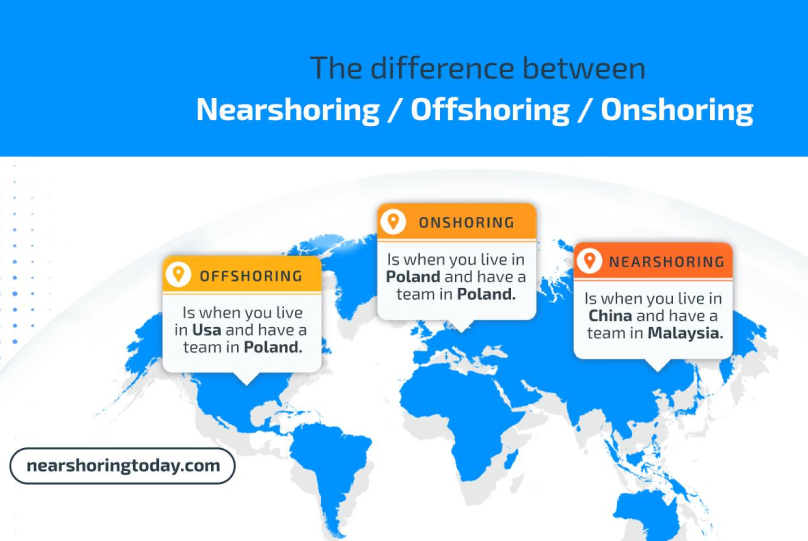Introduction

In today's fast-paced and competitive business landscape, companies increasingly consider outsourcing a strategic option for software development projects. Outsourcing allows organizations to access specialized skills, reduce costs, and accelerate time-to-market. Two popular outsourcing models that have gained significant attention in recent years are offshore and nearshore outsourcing.
Offshore software development involves partnering with offshore software development companies in geographically distant countries from the client's home country, often in regions like Asia, Eastern Europe, or Latin America. On the other hand, nearshore outsourcing entails collaborating with software development teams in neighboring or nearby countries, typically sharing similar time zones and cultural affinities. Both models offer distinct advantages and considerations, making choosing between them a crucial decision for companies seeking to optimize their software development processes.
A survey conducted by Deloitte found that 53% of North American organizations outsource their software development projects, with 42% choosing offshore destinations and 21% opting for nearshore partners.
Canada has emerged as a prominent nearshore outsourcing destination for North American companies due to its highly skilled workforce, cultural proximity, and competitive cost structure. According to a report by Grand View Research, the country's software development outsourcing market is projected to reach $18.23 billion by 2026.
The United States continues to be a leading consumer of offshore software development services, with an estimated market size of $64.32 billion in 2021, as reported by Statista. Companies leverage offshore outsourcing to tap into global talent pools and gain access to a diverse range of technical expertise.
IT Outsourcing Worldwide: A Growing Market
According to Statista, the IT outsourcing industry has been experiencing substantial growth worldwide, with projected revenues reaching US$460.10 billion in 2023. This robust expansion is anticipated to continue at an impressive annual growth rate (CAGR 2023-2028) of 11.07%, resulting in a market volume of US$777.70 billion by 2028.
Increasing Spend per Employee
As the IT outsourcing market expands, businesses are willing to invest more in outsourcing services to enhance operational efficiency. The average Spend per Employee in the IT Outsourcing market will reach US$132.10 in 2023. This figure indicates the growing significance of IT outsourcing as a strategic option for companies to streamline their processes and stay competitive in the global marketplace.
The United States: Dominating the Market
In the competitive landscape of global IT outsourcing, the United States stands out as the leading revenue generator. It is projected to contribute a significant portion of the market's revenue, with an estimated US$167.90 billion in 2023. This dominance can be attributed to the country's robust IT infrastructure, a wealth of technology-driven enterprises, and a strong outsourcing culture to achieve cost efficiencies.
The global IT outsourcing market is experiencing a remarkable surge, driven by companies seeking to leverage external expertise, optimize costs, and focus on core competencies. With technology becoming increasingly central to business operations, IT outsourcing is expected to remain a pivotal element in companies' growth strategies worldwide. As the market evolves, businesses must adapt and leverage IT outsourcing services to stay ahead in an ever-changing technological landscape. Hiring a trusted offshore software development company or nearshore development partner is a desired business goal for many countries worldwide.
Nearshore software development services
Nearshore outsourcing involves collaborating with software development teams located in neighboring or nearby countries that share similar time zones and cultural affinities. Some key advantages of nearshore solutions development include:
Advantages of nearshore outsourcing
Proximity and Time Zone Alignment
Nearshore solutions allow for better collaboration and communication due to the geographical proximity and overlapping working hours. This facilitates real-time interactions, reduces delays, and enhances overall project efficiency.
Cultural Affinity
Nearshore software outsourcing often involves partnering with teams with similar cultural values and business practices. This cultural alignment helps foster better understanding, smoother collaboration, and a shared vision for project success.
Cost Efficiency
While nearshore outsourcing may not offer the same cost savings as offshore software development outsourcing, it can still provide a more cost-effective option than onshore development. Lower labor costs, reduced travel expenses, and time zone advantages contribute to overall cost efficiency.
Disadvantages of nearshore outsourcing
Limited Talent Pool
Nearshore outsourcing may have a smaller talent pool compared to offshore destinations. This can limit the availability of specialized skill sets or niche expertise required for certain complex projects.
Higher Than Offshore Software Development Cost
While nearshore outsourcing can be cost-effective, it may not offer the same cost savings as offshore outsourcing. Organizations with tighter budget constraints might find the cost differential between nearshore and offshore options a significant factor.
Benefits from offshore software development companies
Offshore software development is a type of outsourcing involving partnering with software development companies in geographically distant countries from the client's home country. Let's consider the key advantages of offshore outsourcing.
Offshore software development benefits
Cost Savings
Offshore software development company is known for its cost-saving potential. The offshore development company offers lower labor costs, which allow businesses to reduce product development costs and allocate resources to other strategic initiatives.
Access to the Global Talent Pool
Offshore software companies offer access to a vast talent pool of skilled professionals worldwide. This allows companies to tap into specialized expertise that may not be readily available domestically, facilitating innovation and efficiency in software development.
Scalability and Flexibility
The offshore software development process offers scalability, allowing organizations to quickly ramp up or down their development resources based on project requirements. This flexibility enables businesses to adapt to changing needs and handle projects of varying sizes and complexities.
Time Zone Differences for Continuous Work
Offshore software company leverages time zone differences to enable round-the-clock development. When the onshore team finishes work for the day, the offshore team can continue the development process, potentially accelerating project timelines and improving efficiency.
Access to Global Markets
Offshore outsourcing providers may have insights and expertise in global markets and can assist with internationalization and localization efforts, helping organizations expand their reach.
Offshore software development disadvantages
Communication and Language Barriers
Offshore software development companies may present challenges in terms of communication due to language barriers and cultural differences. Effective communication strategies, language proficiency, and cultural understanding are crucial for successful collaboration within the product development process.
Time Zone Differences
Operating in different time zones can delay communication with offshore software development companies and project coordination. Scheduling meetings or addressing urgent matters may require careful planning and coordination to overcome time zone challenges with the company abroad.
Data Security and Intellectual Property Concerns
Offshore software development services involve sharing sensitive business information with external teams, raising concerns about data security and intellectual property protection. Establishing robust security measures and contractual agreements and conducting thorough due diligence with offshore developer are vital to mitigate these risks.
US and Canada perspective on nearshore software development outsourcing

The US and Canada have a significant nearshore relationship, primarily driven by their robust economic ties and geographic proximity. The nearshore model allows companies in the United States to outsource certain business functions or services to Canadian companies. This outsourcing can include various sectors such as information technology, customer support, software development, engineering, and more. Companies in the US often choose to nearshore to Canada to take advantage of the skilled workforce, cost efficiencies, and shared cultural and language similarities.
Central America is a region located between North America and South America, consisting of seven countries: Belize, Costa Rica, El Salvador, Guatemala, Honduras, Nicaragua, and Panama. While Central America is not typically considered a nearshore destination for the United States due to its geographical distance, it does play a significant role in the nearshoring industry.
Central America has emerged as a popular nearshore outsourcing destination for companies primarily from the United States. The region offers several advantages: lower labor costs, a growing pool of skilled talent, proximity to North America, cultural affinity, and favorable time zone overlaps. Many companies in the US nearshore their business processes to Central American countries to leverage these advantages.
US & Canada offshore software development
South America is a popular offshore outsourcing destination for companies in North America, including the United States and Canada. Countries like Argentina, Brazil, Chile, Colombia, and Uruguay have established themselves as key players in the offshore market. These countries offer a combination of lower labor costs, a growing pool of skilled professionals, and cultural proximity to the United States and Canada. Offshore outsourcing to South America is particularly common in software development, IT services, customer support, and business process outsourcing.
Eastern Europe is another well-known offshore software development region, and Poland stands out as one of the leading countries in the region. Poland has gained recognition for its highly skilled workforce, competitive offshore software development rates, and strong technology sector. The country has a rich pool of software developers, engineers, and IT professionals, making it an attractive destination for offshore outsourcing. Polish companies excel in areas such as software development, web development, mobile app development, and IT infrastructure services.
In fact, according to the article on Hackernoon, Poland is ranked third in the world based on its programming skills. The article highlights the programming capabilities of various countries, and Poland's impressive performance reinforces its reputation as a hub for top-quality software development talent.
Western Europe's perspective on nearshore software development outsourcing

In Western Europe, nearshore outsourcing refers to outsourcing business processes or services to neighboring countries within the same region. This approach offers several advantages, such as geographical proximity, cultural affinity, similar time zones, and ease of collaboration. Companies in Western European countries, such as the United Kingdom, Germany, France, and the Netherlands, often engage in nearshore outsourcing to Eastern European countries.
Eastern Europe, including Poland, has emerged as a prominent nearshore outsourcing destination for Western European countries. Poland, in particular, is recognized for its high-quality IT and software development services. The country boasts a skilled workforce, competitive rates, a favorable business environment, and a growing tech industry. Polish companies excel in software development, web development, mobile app development, cybersecurity, and other IT-related services.
As we’ve written before, according to the article on Hackernoon, Poland ranks third globally in terms of programming skills. This ranking highlights the country's expertise in the field and reinforces its reputation as a top-quality nearshore outsourcing destination in Eastern Europe.
Western Europe's perspective on offshore software development outsourcing
In Western Europe, offshore outsourcing involves contracting out business processes or services to countries outside the region, typically on different continents. Western European countries, such as the United Kingdom, Germany, France, and the Netherlands, often use offshore development teams to leverage cost advantages, access specialized skills, and expand their global reach.
India is widely recognized as one of the major offshore outsourcing destinations globally. The country has a large pool of professionals, particularly in IT and software development. Indian companies offer various services, including custom software development, web and mobile development services, IT support, customer service, back-office operations, and more. But the skills and professionalism of said software development aren’t the best - companies that use its offshore outsourcing software development usually complain about its code quality. The competitive development cost and the availability of English-speaking talent make India a preferred choice for Western European companies to establish cooperation with offshore partner from this region.
Vietnam has also emerged as a popular offshore outsourcing destination due to its cost-effective solutions and a growing pool of skilled professionals. The country offers custom software development, mobile app development, website development, and IT-enabled services. Vietnam's proximity to Western Europe in terms of time zones and its competitive pricing and talent pool make it an attractive opportunity for having an offshore software development company as a partner in this location.
Malaysia, known for its strong technology infrastructure and skilled workforce, is another offshore outsourcing destination in Western Europe. The country provides services in custom software development, offshore software testing services, IT infrastructure management, digital marketing, and business process outsourcing. Malaysia's multicultural environment, English proficiency, and favorable business environment contribute to its appeal as an offshore development location.
Central Asian countries, including Kazakhstan, Uzbekistan, and Kyrgyzstan, are increasingly gaining attention as emerging offshore destinations for Western European companies. These countries offer competitive rates, a growing pool of skilled professionals, and government initiatives to promote the IT industry. While they may be relatively new players in the offshore market, they have the potential to become significant offshore development and outsourcing hubs in the region.
With its vast population and diverse talent pool, China has long been a popular offshore destination for Western Europe. The country offers various outsourcing services, including manufacturing, custom software development, IT services, customer support, and more. China's large market size, technological capabilities, and cost advantages make it an appealing choice for Western European companies looking to find offshore development companies for their operations.
In summary, Western European countries target offshore development outsourcing activities to various countries outside the region to access cost advantages, specialized skills, and global expansion opportunities. India, Vietnam, Malaysia, Central Asia, and China are prominent destinations offering unique advantages and services to Western European companies where offshore software development company can be found.
Australian perspective on nearshore software development outsourcing

In the context of Australia, several countries in the Asia-Pacific region can be considered nearshore countries for software development.
India is a leading nearshore software development destination for Australian companies. With a large pool of highly skilled IT professionals and a strong presence in the software development industry, India offers a wide range of outsourcing services. Indian companies specialize in software development, web development, mobile app development, quality assurance, and more. The time zone proximity between India and Australia also enables effective communication and collaboration.
Vietnam has gained popularity as a nearshore outsourcing destination for Australian companies. The country offers competitive pricing, a growing tech industry, and a skilled workforce. Vietnamese companies excel in software development, web development, mobile app development, and IT services. Australian businesses benefit from the proximity, cultural compatibility, and availability of a talented workforce in Vietnam.
Malaysia is another attractive nearshore destination for Australian companies seeking software development services. The country has a well-developed technology sector and a competent workforce. Malaysian companies provide software development, IT infrastructure management, digital marketing, and more services. Proximity, English proficiency, and a favorable business environment make Malaysia an appealing option for nearshore partnerships.
While Central Asian countries like Kazakhstan, Uzbekistan, and Kyrgyzstan are relatively new players in the nearshore market, they are investing in developing their IT industries. These countries offer cost-effective solutions, a growing talent pool, and favorable business conditions. While they may be still evolving, their proximity to Australia and their commitment to enhancing their outsourcing capabilities make them worth considering.
Also, China, with its technological advancements and vast resources, can also be considered a nearshore destination for Australian companies. Chinese companies provide outsourcing services in various domains, including custom software development, manufacturing, IT services, and more. The country's strong emphasis on education and research has nurtured a skilled workforce capable of delivering high-quality solutions.
Australian perspective on offshore software developers
Eastern Europe, including countries such as Poland, has emerged as a prominent software development offshoring destination for Australian companies seeking high-quality offshore software development companies and services. Poland, in particular, has gained recognition for its skilled IT professionals, competitive rates, and strong technology sector. The country offers a range of services, including software development, web development, mobile app development, and IT infrastructure management. Polish offshore software development companies are known for their technical expertise, commitment to quality, and ability to deliver complex projects effectively.
Again, according to the article on Hackernoon titled " Which Country Would Win in the Programming Olympics? " Poland ranks third globally in terms of programming skills. This ranking highlights the country's excellence in programming and reinforces its reputation as a top software outsourcing partner. Australian companies can leverage Poland's talented workforce and technical capabilities for their software development needs.
Latin America, including countries like Mexico, Brazil, and Argentina, also serves as an attractive offshoring software development outsourcing destination for Australian companies. These countries offer proximity to Australia, cultural compatibility, and a skilled workforce. Latin American companies specialize in custom software development, mobile app development, and IT services. They have demonstrated their ability to deliver high-quality solutions while maintaining effective communication and collaboration with Australian companies, which presents them as an attractive offshore development services destination.
What onshore software development outsourcing is?
Onshore outsourcing of software development, also known as domestic outsourcing, refers to contracting or outsourcing software development services to third-party companies or professionals located within the same country or geographic region as the hiring company or client. In onshore outsourcing, the client company still relies on external resources but chooses to work with local service providers rather than handle the development in-house or outsource it to offshore or distant locations.
Essential characteristics of onshore outsourcing of software development:
Geographic Proximity: Onshore outsourcing partners are located in the same country or region as clients, making it easier to access and collaborate with them. This proximity can lead to more seamless communication and coordination.
Cultural Compatibility Onshore outsourcing often involves working with service providers who share the same or similar cultural norms, language, and business practices as the clients. This can enhance understanding and alignment between the client and the outsourcing partner.
Legal and Regulatory Alignment Onshore outsourcing typically entails compliance with the same legal and regulatory frameworks, reducing potential issues related to intellectual property protection, data privacy, and client contractual obligations.
Time Zone Convenience Clients and onshore outsourcing partners usually operate in the same or closely aligned time zones, simplifying real-time communication and minimizing time zone-related challenges.
Quality and Expertise: Onshore outsourcing providers are often chosen for their high-quality work, technical expertise, and adherence to industry standards. Clients may have confidence in the skills and capabilities of local service providers.
Control and Oversight: When working with onshore partners, clients may feel a greater sense of control and visibility over the outsourced software development process. If needed, they can visit the outsourcing partner's location and closely monitor the project's progress.
Face-to-Face Interaction: The geographic proximity allows for more frequent face-to-face meetings, which can be beneficial for building strong working relationships and ensuring that the project aligns with the client's business objectives.
Onshore outsourcing is typically chosen when clients prioritize factors like communication, quality, and cultural alignment and are willing to pay a premium for these advantages. It is often contrasted with offshore outsourcing, where software development services are contracted to companies or professionals located in distant countries, and nearshore outsourcing, which involves contracting services to providers in nearby countries or regions.
Ultimately, the decision to opt for onshore outsourcing or another outsourcing model depends on various factors, including the project's budget, specific requirements, project delivery, and the client's preferences for collaboration and communication. Each outsourcing approach has its own set of advantages and trade-offs, and the choice should be made based on the unique needs and priorities of the software project and the client's organization.
How should you choose an offshore software development company?
Finding an excellent offshore software development company in Poland or any other country requires careful research and consideration. Here are some steps you can follow to find a reliable software development partner and top software outsourcing partner as well:
Define Your Project Requirements
Before searching for an offshore software development company, clearly understand your project's scope, goals, and requirements. Defining the main processes, modules, and features of the desired mobile or web app would help potential offshore vendors visualize how the app should work and what technology could be required to implement and release such an app on the market. Moreover, this will help you communicate effectively with potential offshore company and ensure they understand your needs.
Research Online
Use search engines and business directories to find software development companies in Poland. Websites like Clutch, GoodFirms, and LinkedIn can help discover potential partners and read reviews. Moreover, countries like Poland and Ukraine have business associations of software development companies that gather trusted and well-established top software companies. Regarding the potential Polish software outsourcing partner, please check the SoDA organization page.
Ask for Recommendations
Seek recommendations from your network, colleagues, or industry peers who have experience with offshore software programmers. They can provide valuable insights and referrals. Moreover, don’t hesitate to publish posts on social channels, especially LinkedIn where business and tech professionals from your network could help recommend proper offshore developers.
Check Portfolios
Look for an offshore development team with a strong portfolio that showcases their previous work. Pay attention to projects similar to yours regarding complexity and technology stack, but
Assess Technology Stack
Ensure the particular software development team has experience with the technologies and tools required for your desired custom software. Check if they specialize in the programming languages (JavaScript, .NET, Java, or any other) and frameworks (ReactJS, Angular, VueJS, NodeJS, Lavarel, ASP.NET, or any other) you need.
Evaluate Expertise
Consider the offshore software engineering team's expertise in your industry or domain. Developers with relevant industry experience may better understand your business needs.
Check Clients References
Request client references from the company and contact their past clients to ask about their experiences working with the company.
Visit Their Website and Social Media
Vendor’s websites and social media profiles, especially the most business ones on LinkedIn, can provide insights into their culture, values, and recent projects. Look for the professionalism and transparency of your next software vendor.
Assess Communication Skills
Effective communication is crucial when working with an offshore vendor. Ensure the outsourcing software development company and its developers have strong English language skills and are responsive to your inquiries.
Evaluate Cultural Fit
Consider cultural compatibility. An offshore software development company, IT specialists, and developers with a similar work culture and values may lead to better collaboration.
Ask About Security Measures
Inquire about the company's data security practices and measures to protect your intellectual property. Ask them for password managers, remote device and software management applications, GDPR compliance, and non-disclosure agreements policy with developers, employees, and vendors.
Discuss Pricing and Cooperation Form
Talk about possible cooperation forms. Request detailed pricing information, and make sure you understand the billing structure, payment terms, and any additional costs.
Visit or Arrange Video Calls
Arrange in-person visits or video calls to meet company developers and product team and discuss your project face-to-face whenever possible. This helps establish trust and rapport.
Legal and Contractual Aspects
Review the contract carefully, including intellectual property rights, confidentiality agreements, and dispute resolution mechanisms that should protect you as a Client and reduce the intellectual property risks to a minimum.
Start with a Small Project or Product Development Workshop
Start with a smaller project as a trial run before committing to a long-term partnership if possible. This allows you to assess the company's capabilities firsthand and the quality of its offshore developers. Another good option is to start with product development workshops that will enable you to evaluate the offshore software development company's soft and hard skills and fully clarify product vision and backlog.
Conclusion
In conclusion, outsourcing has become essential for companies navigating today's dynamic and competitive business landscape. Offshore and nearshore outsourcing have emerged as popular models for software development projects, offering distinct advantages and considerations.
It is worth highlighting the prevalence of outsourcing among North American organizations, with 53% opting for outsourcing, of which 42% choose offshore destinations, and 21% prefer nearshore partners. These statistics underscore the significance of outsourcing as a strategic choice for accessing specialized skills, reducing costs, and accelerating time-to-market.
In summary, the choice between nearshore vs offshore software development outsourcing is critical for companies looking to optimize their software development processes. The statistics and market projections demonstrate the increasing adoption and significance of outsourcing in the software development industry. Organizations can strategically leverage outsourcing to gain a competitive edge, drive innovation, and succeed in software development by carefully evaluating their specific needs, priorities, and considerations.
Exploring the Business Facets of Software Development
The business strategy behind software development is as crucial as the technology itself. At Mobile Reality, we provide a deep dive into the various business models, methodologies, and strategies that drive profitable and efficient software creation. Our comprehensive articles are designed to guide you through the complexities of the custom software development business:
- A guide through software development models
- Fixed price vs T&M or mix in software development
- Fintech Development Outsourcing Guideline for Executives
- In House vs Outsourcing Software Development in 2025
- Kanban vs. Scrum vs. Waterfall in IT Projects
- Product Development Workshops with Mobile Reality
- No Code / Low Code vs. Custom Traditional Development
- Building profitable digital web, mobile apps and products
- How technologies help to protect nature : 5 cases
- Generative AI in software development
- 5 key aspects of successful project management
- Discover the Best ESG Software Solutions for SMEs
- Everything To Know About Medicine Delivery App Development
These resources are crafted for those looking to refine their approach to building and managing software projects. Whether you’re contemplating the most effective development methodology, weighing the pros and cons of outsourcing, or deciding on the right pricing model, our insights can lead to informed decisions. Contact our team for a personalized consultation on software development business strategies. We’re here to help you navigate the path to success in the digital product landscape.





